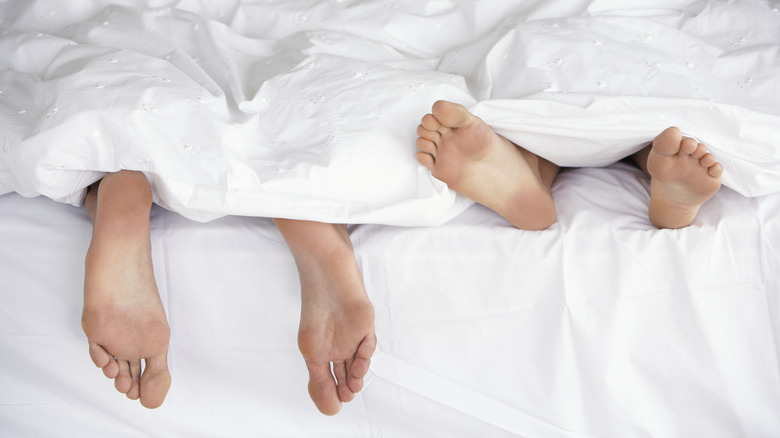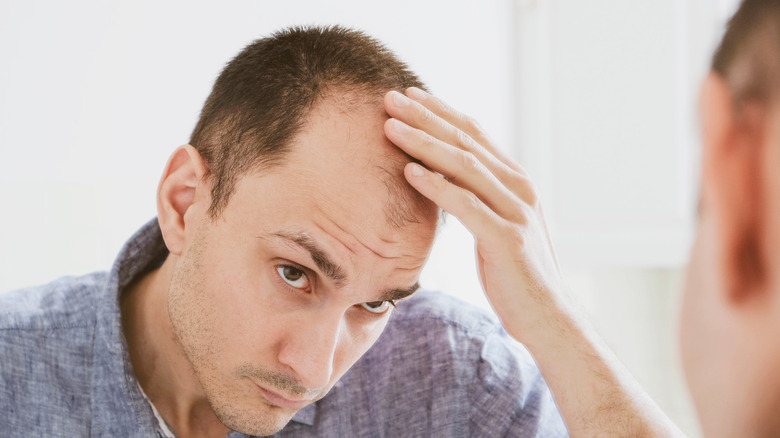How Finasteride Might Affect Your Sex Drive
Finasteride was initially approved by the U.S. Food and Drug Administration (FDA) as a means of treating an enlarged prostate, also known as benign prostatic hyperplasia (BPH).However, five years after the drug's initial approval, the FDA also approved finasteride to treat male pattern baldness under the name Propecia. Today, finasteride is a common treatment for hair loss, with a 2014 study published in the Indian Journal of Dermatology showing that almost 60% of patients who took finasteride deemed it effective.
The way finasteride works is by blocking an enzyme known as 5-alpha-reductase, which can cause both hair loss and prostate growth in men (via Mayo Clinic). While taking the medication, men can see a spike in their testosterone, which will both shrink the prostate and spur the growth of new hair. However, the medication will only work while it is being taken. Once a person goes off of it, the effects will begin to reverse. In addition, finasteride can cause some troubling side effects for men, particularly when it comes to sex drive, performance, or even the ability to maintain an erection.
Finasteride can throw off your body's hormones
According to a 2011 study published in the Journal of Sexual Medicine, 94% of men reported a lowered sexual desire while taking finasteride, while 92% percent said that they had developed problems either achieving or maintaining an erection. Additionally, a 2016 study published in Andrology showed that 87% percent of men profiled reported a loss of penis sensitivity, and 82% cited a decrease in the force of ejaculation.
The sexual side effects of finasteride may be a result of the medication's ability to lower the body's levels of dihydrotestosterone, or DHT (via Drugwatch), a hormone produced by testosterone that is believed to be one of the reasons men suffer from hair loss. In addition to bringing down DHT levels, finasteride may also convert testosterone into a female sex hormone known as estradiol. These increased female hormone levels could play a role in other concerning side effects for men, such as gynecomastia, or enlarged breasts, according to a 2009 study published in the International Journal of Trichology.
Sexual side effects are not permanent
Although there is a risk of sexual side effects from taking finasteride, a 2014 study published in the Journal of Clinical and Aesthetic Dermatology concluded that the drug is generally well tolerated and the sexual side effects are reversible. However, men who go off of Propecia should be aware of the slight risk of post-finasteride syndrome, a condition that can cause anxiety, sexual problems, and other psychological issues, per a 2019 report published in Skin Appendage Disorders. However, the condition is rare, with study authors reporting only one case in more than 20 years of treating patients with finasteride.
It's important to note that women who live with men who are taking finasteride and are either pregnant or planning to get pregnant should not handle crushed or broken finasteride pills, as the drug can be absorbed through the skin and cause male birth defects, per Mayo Clinic.
Despite the potential side effects, in general, finasteride is considered safe, with many patients being able to take it for years without any issues (via NHS). If you are experiencing any sexual side effects, from a loss of libido to problems with ejaculation, you should talk to your primary care physician. In addition, you should talk to your doctor before deciding to take finasteride in the first place, as they may want to consider your medical history and look at other treatments instead.



